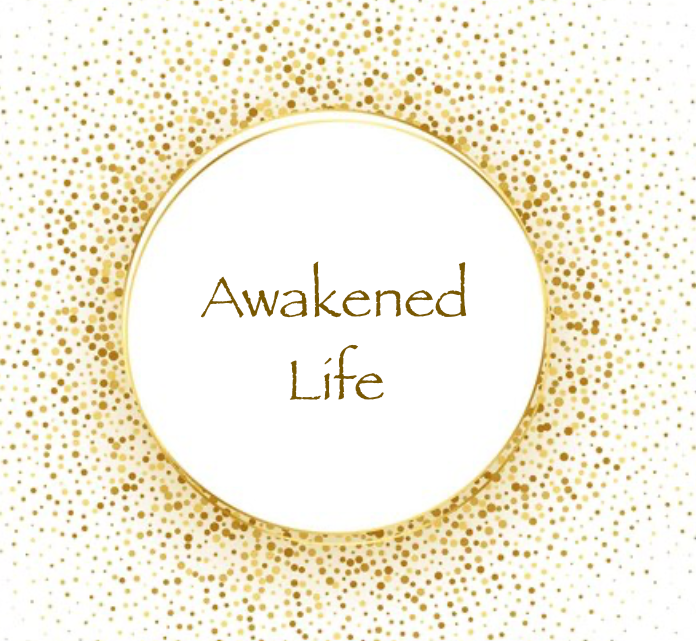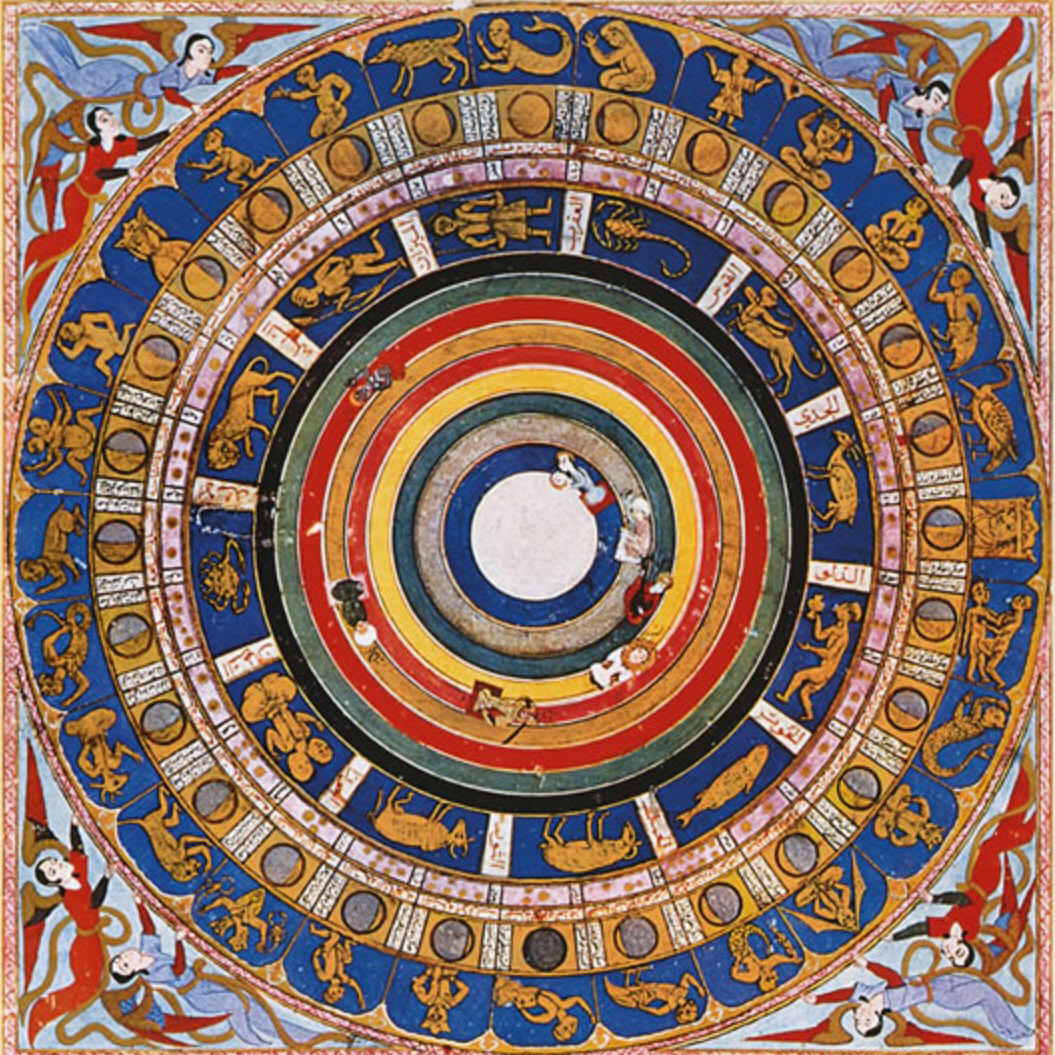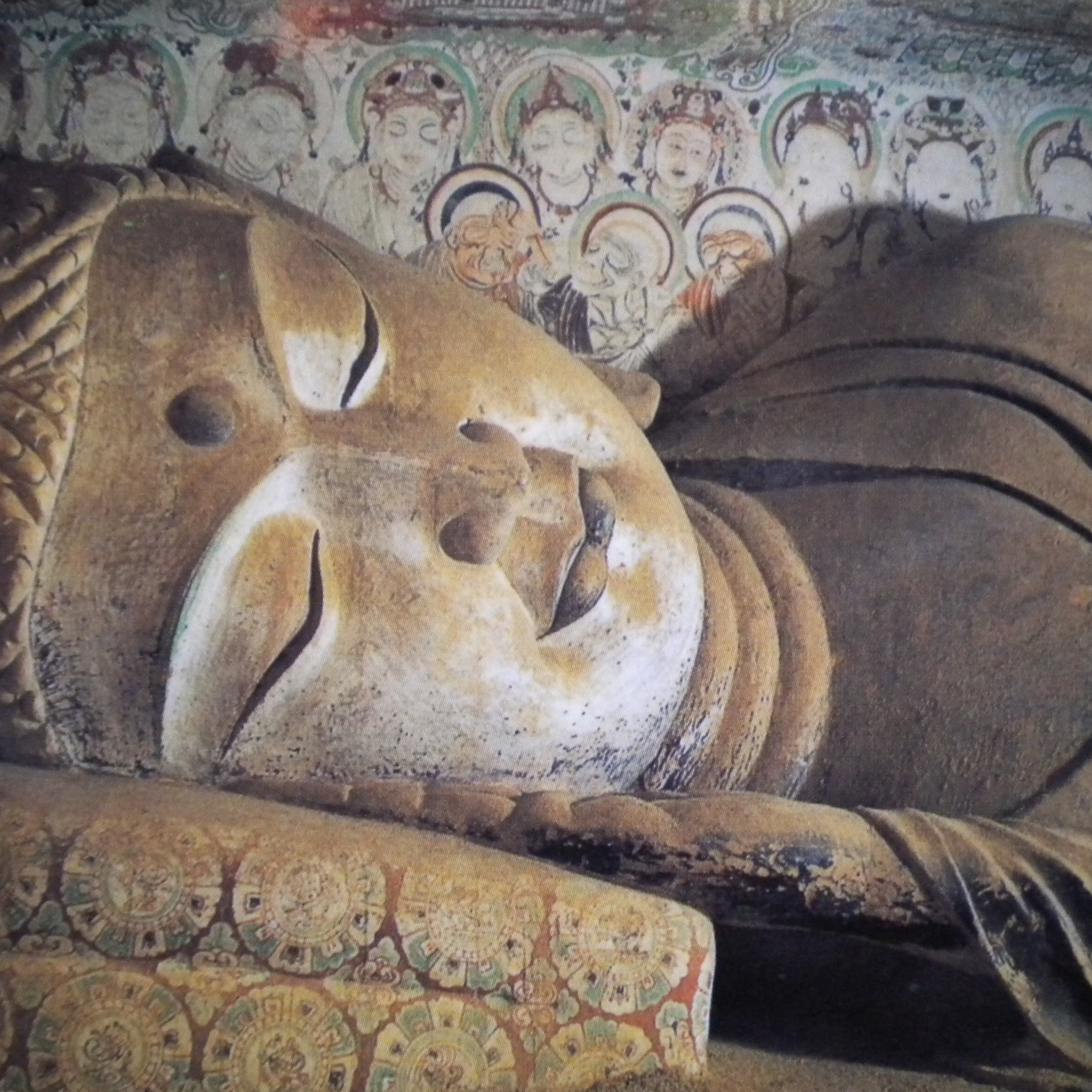I think therefore I am
not
Researchers have discovered that we process approximately 60,000 thoughts every day and about 95% of those thoughts are the same ones we had the day before. Based on this data, we might conclude that our usual thoughts are not all that original and maybe we need a software update.
To insult ourselves even more, researchers also report that we seem to foolishly focus on negative thoughts more than positive ones. This phenomenon is known as the negativity bias or positive-negative asymmetry. As Mark Twain insightfully quipped, “My life has been filled with terrible misfortunes. Most which never happened!”
We’ve evolved this tendency to focus on the negative in order to assure we learn how to avoid repeating experiences that could induce trauma. That's ironic since the negativity bias can actually encourage a repetition of the painful emotional memories associated with any trauma. And don't we all want to avoid unnecessary self-inflicted suffering?
If we’ve spent decades repeating negative thoughts to ourselves can we learn to live beyond history and an often inaccurate history at that? The term "monkey mind" is often used by meditation teachers to the restless nature of the mind. Can we calm and cheer up our monkey minds?
4 simple reminders to support waking up every day
Waking up goes against the grain of our collective conditioning. It can be helpful to integrate several simple reminders into your day so you're less likely to get pulled into the undertow of unconscious conditioning. These days we're flooded with self-improvement tips. But integrating a few simple practices into your day will enrich your life and serve as a reminder that you are not the thoughts arising from your conditioned mind. Your essential nature is unconditioned awareness.
Slow Down Be Spacious
For many people today the ideal life is a busy life. Being busy is associated with being important, interesting, and successful. But often a busy life leads to a busy mind. The busier the mind is the less likely we'll notice a pattern of compulsive or negative thinking. The restless energy of the thinking mind fuels the undertow of our unconscious conditioning. The ability to notice the mind versus react to it is key to living an awakened life.
One of the helpful things about any meditation practice is that you set aside time to become more aware of your mind instead of automatically identifying with it. But, unless you want to become an expert meditator, you don't need to devote hours a day to meditation to live an awakened life.
We've learned to privilege thought and shape our identity around our thinking patterns. But rather than feeling bossed around by voices in your head, you can experience the mind as a space where thoughts come and go, like waves on the ocean. Then you feel free to consider which thoughts are helpful at this moment and which ones are not.
If you question your thinking patterns you can decolonize your mind. You can ask yourself, is this thought helping me right now? Is it useful? Doesn't this sound like a way to subvert the negativity bias of the monkey mind?
“All kinds of thoughts arise. They become the general gossip of your mind. Just let it go. Good and bad, happy and sad, all thoughts vanish into emptiness like the imprint of a bird in the sky.” Chogyam Trungpa
Thoughts come and go in the spaciousness of mind. The spacious nature of our awareness is always present but habitually overlooked in favor of thought. But from the perspective of a spacious mind we can experience thoughts with minimal reaction. When you do notice you’re reacting to a thought, just gently bring your attention back to the spaciousness of awareness.
A spacious mind is clear and alert but as generous as the sky. Allow thoughts and feelings to come and go like clouds in the sky. Let thoughts float by like bubbles on air in this spacious field of awareness. Notice how you feel when you experience moments of abiding in spacious awareness. In this moment do you feel more content, present and free?
Enjoy any opportunity to experience the “space” between thoughts which is unconditioned awareness, your essential nature. Occasionally ask yourself, who is aware of passing thoughts, feelings and sensations? "I am aware. I am awareness. I am the one who is simply aware."
Thoughts and feelings arise in the spaciousness of your essential nature, unconditioned awareness. But our essential nature is fundamentally free and independent of its changing contents - thoughts, feelings, perceptions, etc.
"You know moments in your life when a thought completely disappears into silence, but still you are.” Jean Klein
The habit of focusing on the “things” that arise in the mind, rather than on the spacious nature of mind, is similar to our tendency to focus on things in our environment and overlook space. In the contemplative photography class I teach we have a practice period focused solely on appreciating the space in our environment versus the objects within space. Similarly we can enjoy the spaciousness of awareness versus objects of awareness like thoughts, feelings or perceptions.
In the external environment we experience space most obviously in the sky. You might like to try Sky Gazing meditation, rooted in the Dzogchen tradition of Vajrayana Buddhism. Several minutes of enjoying sky gazing will support the experience of mind as spacious as the sky. Thoughts appear and disappear in the spaciousness of awareness like clouds or birds appear in the vast space of the infinite sky. Research indicates that even just a few moments of gazing at the sky can increase your level of contentment.
Guidance for Sky Gazing Meditation
The point of this adaptation of the Dzogchen Sky Gazing meditation is not to “space out” nor is it to have some special experience but really there is no way to do it wrong and it doesn't matter how long you do it. Choose a spot where you can be comfortable relaxing and have a view of the open sky if possible. For example, you may sit, or preferably lie, in a chair or on a blanket outside or sit by a window.
With eyes closed take a few moments to settle into mindful awareness of your physical presence and the gentle flow of your breath wherever you most easily experience it. If you find the experience of your breath too subtle, rest a hand on your belly area and you'll notice its gentle rise and fall with each breath. At some point expand your awareness to become receptive to sounds as they appear and disappear in the field of awareness. Simply listen rather than labeling sounds as passing cars, birds, etc. or categorizing them according to preferences. Simply listen and be receptive. For just a few moments, engage in what nondual teacher Jean Klein described as "multidimensional welcoming with no center."
Now open your eyes and softly rest your gaze on the sky. If you can, fill your visual field only with your experience of the sky to enjoy panoramic vision. Continue to rest your awareness on the flow of your breath as you visually enjoy the vastness of the sky, with a soft gaze.
When thoughts and feelings arise, just let them pass like clouds in the sky. Let them arise and dissolve like the flow of your breath. Notice the space between thoughts. If your vision seems a bit cloudy at any point feel free to close your eyes momentarily and then open them again for a refreshed view. Continue to enjoy this experience of spacious awareness for as long as you wish.
Experimenting with sky gazing supports feeling the spaciousness of awareness. Especially when you feel your mind is getting "cluttered," even glancing out a window and gazing at the spacious sky for a few moments while being aware of breathing can really “free up some space” mentally and remind you of your essential nature, spacious unconditioned awareness.
Be Here Now
The suggestion to be present in this moment can easily be dismissed in favor of the latest self-improvement tip. But Sufi poet Rumi's guidance to "live in the now you came from" goes against the grain of decades of conditioning. Integrating this simple shift in awareness into your daily life supports an abidance in your essential nature and deepens your enjoyment of life.
Remember that of the 60,000 thoughts we have every day about 95% are the same ones we had the day before? Have you noticed how often you time travel to the past or future? Our ability to think about objects and events that are not immediately in front of us is one of the unique abilities that make us human. Without this ability, we'd have no engineers or novelists.
But we can be so used to rehashing the past or projecting into the future we don’t realize how much time we've spent imagining life instead of living it. Are we really aware of reality as it is, right now? Thoughts rarely reflect reality. Instead, they create a virtual reality. Now is the time to remember to be fully present in the present moment. When we are deeply present in the moment we experience a spacious mind. This is meditation in action.
"The past is fiction and the future is a dream, and we are just living on the edge of a razor blade.” Chogyam Trungpa
Life is always lived now. Even thoughts about the past or future happen in the now. Everything is happening now. Nothing has ever happened outside of now.
"Life can be found only in the present moment. The past is gone. The future is not yet here. If we do not go back to ourselves in the present moment, we cannot be in touch with life." Thich Nhat Hanh
Have you noticed that thoughts of "if only" or "what if" don't usually support peace of mind? When you discover you are unnecessarily time traveling once again to days bygone or an imaginary tomorrow simply return to the present moment. You might reinforce this by smiling and saying to yourself “simply now” or "be here now" or just take a moment to enjoy a deep and relaxing breath.
Even during a day filled with challenges, when we remember to be here now, our minds can feel refreshed and less restless. When we return to the present moment we can begin anew, as Thich Nhat Hanh would say, and feel less burdened by the past or concerns about the future.
Be here now and you may discover there is something happening now that you really appreciate. It can be helpful to designate particular times in your day as mindful moments such as when drinking your morning coffee or tea or walking your dog or taking a shower. Find refuge in those times to be mindfully present with how good it feels to drink a cup of flavorful tea or take a warm shower. When you're truly present with your dog your walk together can be a shared joy.
The flower invites the butterfly with no mind
The butterfly visits the flower with no mind
The flower opens the butterly comes
The butterfly comes the flower opens
Ryokan
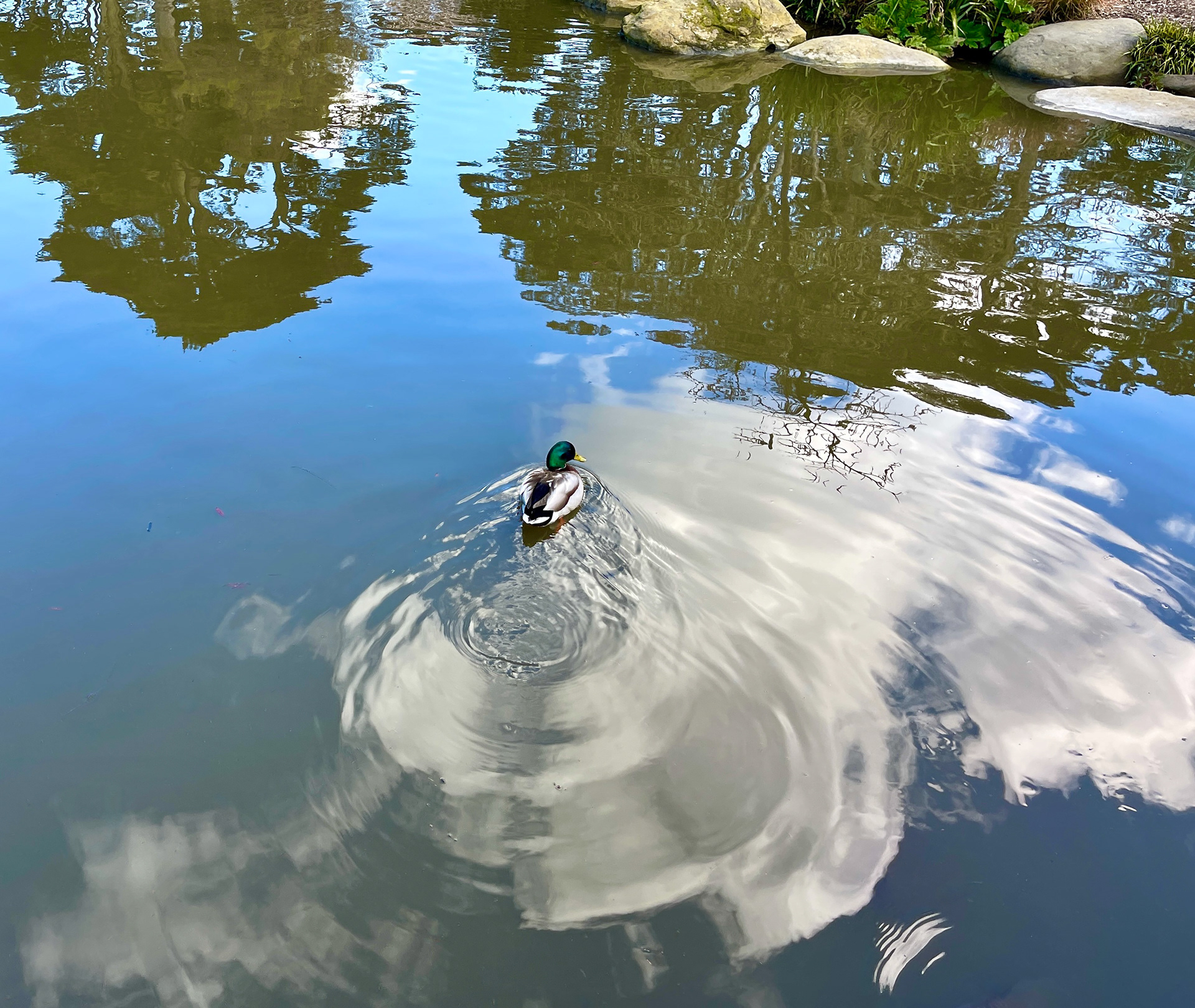
Images by Hollye Hurst
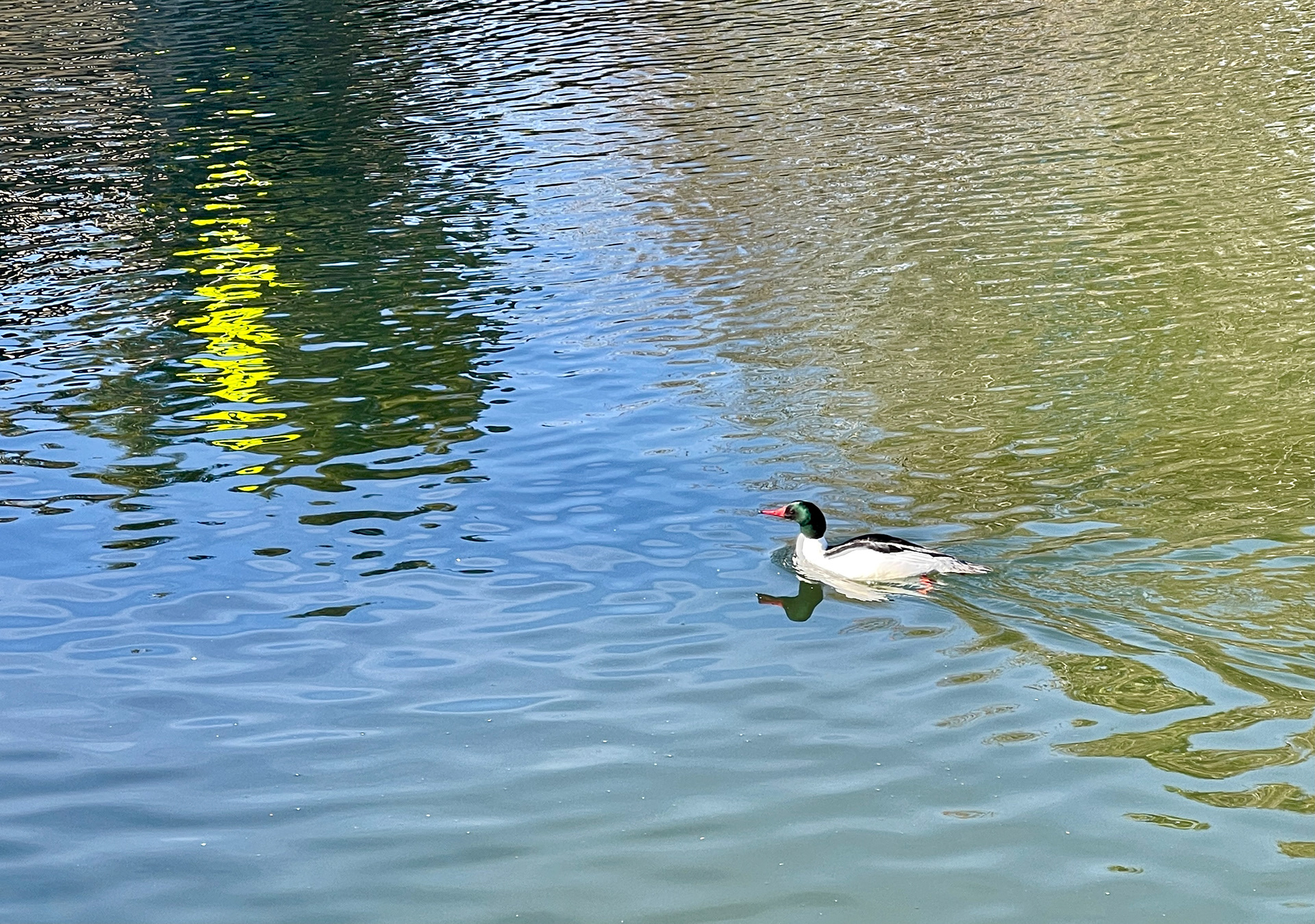
Come Home to Awareness
Most people have been trained to identify who they are with the constant stream of their habitual thoughts. But my thoughts cannot be me because, as an aware being, I can watch these thoughts come and go. You are not your thoughts or feelings. You are the one who is aware of them. Your essential nature is unconditioned awareness, the source of being.
If you've read the "Who am I, really?" blog post, you're already familiar with the benefits of shifting your perspective from identifying with thoughts so you can come home to your essential nature, unconditioned awareness. For example, I'm so angry" shifts to "I am aware of anger. I am aware. I am the one who is aware." This practice is helpful for anyone but it can be particularly therapeutic when a feedback loop of thoughts and feelings continually generates experiences of anxiety, depression or anger.
When you occasionally relax into "simply being aware of being aware" throughout your day it reinforces this understanding and loosens the grip of the monkey mind. Develop the habit of asking yourself "Who is aware of these thoughts or feelings?" The answer to this self-inquiry is always "I am. I am the one who is aware. I am awareness."
As you become less identified with thoughts you'll become more aware of them and how automatic they can be. You will notice that your thinking mind generates habitual storylines that are like scripts read by an actor. It can be helpful to relate to these storylines by humorously characterizing them as an actor playing The Judge, The Complainer, The Victim, etc. But there's no need to disparage these habitual thinking patterns when they occur. Remember they are not who you are - you are awareness. You are "the one who knows."
Mind scripts are just mental habits or conditioning. Often in therapy we discover that a script like The Judge was learned early in life in an effort to defend and empower oneself in the world of separation. The Victim script is an effort to experience self-compassion. These mind scripts are creations of the mind we've outgrown which is why we feel uncomfortable when experiencing them. Being aware of the script now gives you the opportunity to let it go in this moment. Have compassion for yourself. It's been a burden identifying with a script but it's not who you are.
Be With the Energy
We have a bias in favor of thinking over feeling. Many people assume they're empowered and more in control when they're focused on thinking versus feeling - strategizing or criticizing, for example. But compulsive thinking can be a way to escape feelings. For some people compulsive thinking is so entrenched they are often dissociated from their feelings. But the thinking mind can actually take us further and further away from our authentic truth and simple answers to straightforward challenges. We're typically in denial about it but, we can get so caught up in creating a story or designing a strategy, we simply get lost in delusion.
The energy of feeling is more basic than thought so feelings alert us to what's most important and what we truly value. Our feelings are like a river of energy flowing underground in the depths of our being. Feelings inform us about love much more than thoughts do. They guide us to experience our shared being and are an essential guide for connecting and communicating with others.
When you're caught up in a storyline it's helpful to turn off the "subtitles" or thoughts. Instead, discover the current of feeling underneath your thoughts. For example, sometimes people overthink when making a decision instead of simply tuning into how they feel about their options and trusting what they discover.
Buddhist teacher Pema Chodron teaches that, if you let go of thoughts and "stay with the energy" by deeply listening to feelings, you'll make important discoveries. Remember that when you're listening to feelings you don't need to identify with them. You are the one who is listening to feelings - you are awareness. So simply welcome and deeply listen as your feelings reveal more of your wisdom.
Another way of "staying with the energy" is to offer attention to your body when you experience feelings. Our embodied awareness is communicating all the time. For example, "I am aware of feeling angry. I’m aware of tight muscles in my face and shallow breathing. I am aware."
When you can, give yourself a moment to mindfully experience experience feelings in your body whether they are strong or subtle. For a few moments allow any thoughts to dissolve with your out-breath and simply be mindfully present for your feelings. Rather than holding onto or resisting feelings, or making up a story about them, simply feel the energy of feelings as they arise and dissolve like clouds in the sky.
Over time the chemical reactions triggered by strong emotions can put a strain on us physically. An obvious example is when you're thinking "I'm going to be late." If you tune into the subtle feeling of agitation expressed in your body, you realize that this thought is causing unnecessary tension in your body. Nobody needs more tension so be kind to your body by noticing when thoughts are triggering emotional reactions.
Always be kind to your body. Remember that it's a gift from your ancestors and it faithfully performs miracles every moment of your life.
More simple reminders for waking up every day
The Awakened Life™ by Hollye Hurst. All Rights Reserved
Photos: Hollye Hurst Artwork: Nicolas Bruno
Illuminations Blog
